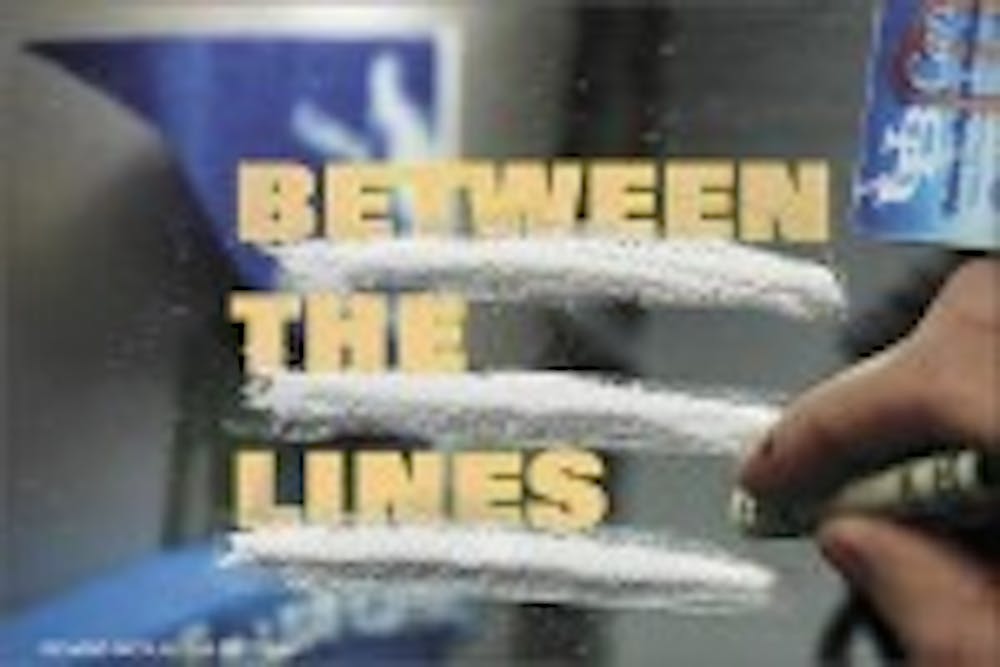Heather is a good student. She gets good grades and has spent a semester in Europe. And when she goes out on the weekend, she might put up $30 to snort some cocaine with her friends.
"Honestly, go to Brick Bar on Saturday night," said Heather, a UB student who asked that her name be changed for anonymity. "You hear the girls in the stall next to you doing it."
At both UB and colleges nationwide, drug use has become more than the stereotype of a kid holding a joint out the window so the RA doesn't catch a whiff. While marijuana is still the only drug students are regularly caught with on campus, some who live outside university housing say that other, more addictive and potentially dangerous narcotics are a regular part of their lives.
According to the U.S. Department of Justice, the percentage of college students who report having used cocaine has doubled in just 10 years, jumping from 2.7 percent in 1993 to 5.4 percent in 2003.
UB Director of Public Safety John Grela, however, said hardcore drugs are not a problem. Other than marijuana, drug use at UB is practically a non-issue, said Grela, who also serves as chief of University Police.
"We don't come across too many hardcore drugs," he said. "We don't have a hardcore drug problem."
Student arrests for possession of drugs other than marijuana, according to Grela, occur only "maybe once a year."
Grela's assessment of how students relate to hardcore drugs comes from his experience as an on-campus officer, though he did say that the Buffalo Police report few instances of UB involvement with cocaine or various drugs other than marijuana.
"We're not getting a lot of information from the Buffalo Police," he said. "Typically, when one of our students gets picked up, they let me know about it."
Students, however, size up the situation differently. Ryan Dendievel, a senior psychology major, said that he finds harder drug use rather commonplace among UB undergrads.
"I know a lot of people that use drugs other than weed," he said.
Dendievel cited the greater fear of getting caught with more serious drugs as the reason that so few are arrested for possession of drugs like cocaine, ecstasy, speed or heroin.
"People who use hardcore drugs are smarter than kids who use weed," Dendievel said. "They have to be."
"I think it's good the UB chief (Grela) thinks there's no hardcore drug problem," he added. "That means they're not looking for them."
But drug use on campus and off campus seems to be two different stories. Dendievel lives off campus, while Grela's experience and knowledge come mostly from dealings in dorms like Ellicott and apartments like South Lake.
Ben Crowley is a junior chemical engineering major and a resident advisor in the Wilkeson Quad of the Ellicott Complex. He says that marijuana is the only drug for which he's had to punish a resident.
"I'm an RA in the dorms, and I've never had a problem with anything other than marijuana," he said, and a number of students interviewed agreed they had never seen use of a more serious drug in any of UB's dorms.
Though on-campus authorities report sparse use of hardcore drugs, students off campus are using them in a number of capacities.
Heather, who lives off campus, says that more students use harder drugs than people think, specifically cocaine.
"Cocaine is a serious problem," she said. "I know people that do it more than they do pot."
Heather also shared her experience with cocaine over the past few months.
"The first time I used it was in November," she said. Since then, she's used the drug about four times a month, usually on weekends, with her friends.
"People that do cocaine don't like to do it alone," she said. "I guess you still feel weird. You don't want to feel like, 'I need to have this.' "
The fear of addiction is something she said kept her from using it earlier in life.
"When we were kids, we were taught that, 'you do it once and you're hooked, or you'll (overdose),' " she said.
Though Heather knows the possible consequences of using the infamously destructive drug, she says she wants to come to her own understanding.
"I've known people that have been ruined by it, and you would think that that would stop me from doing it, but I guess it's like, you want to see for yourself," she said.
She said that putting a stop to her semi-regular cocaine use would not be a problem.
"It's not an issue," she said. "I use drugs and alcohol to deal with social anxiety issues. I don't go out in order to use cocaine."
David Gilles-Thomas, associate director of UB Counseling Services, said that it is not just the recognizable names like cocaine and heroin for which students find themselves in need of therapy to stop using.
"Students are using a wide range of drugs, including over-the-counter and prescriptions," he said.
Gilles-Thomas said that about eight to 10 percent of the students that come in to Counseling Services do so to deal with an addiction of some sort, for any of a variety of substances.





